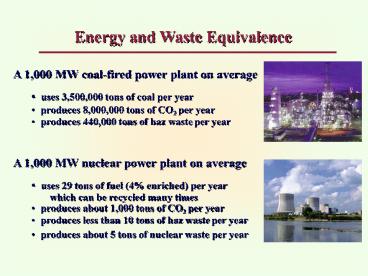Japanese Viewgraphs ALL PowerPoint PPT Presentation
Title: Japanese Viewgraphs ALL
1
Energy and Waste Equivalence
- A 1,000 MW coal-fired power plant on average
- uses 3,500,000 tons of coal per year
- produces 8,000,000 tons of CO2 per year
- produces 440,000 tons of haz waste per year
- A 1,000 MW nuclear power plant on average
- uses 29 tons of fuel (4 enriched) per year
- which can be recycled many times
- produces about 1,000 tons of CO2 per year
- produces less than 10 tons of haz waste per year
- produces about 5 tons of nuclear waste per year
2
Thermal - Pollution or Product?
- Most power plants (nuclear or fossil fuel) are
cooled by water, only a few by air. Cooling may
be by a single pass through the condenser then
discharge to a water body at slightly elevated
temperature. Or the water may be recirculated,
passing through the condenser and then a cooling
tower, using evaporative cooling which consumes
(evaporates) some water - around 5 of the flow
in a once-through system. The cooled water then
is returned to the condenser. - Cooling towers reduce the overall efficiency of a
power plant by 3-5. - Water consumption is the same for nuclear or
coal. Differences result from thermal efficiency
- how much heat has to be deposited into the
environment. A nuclear or coal plant running at
32 efficiency will need to deposit about 5 more
heat than one at 35-36 efficiency. Plants are
generally between 30 and 36. - If designed from the start, this excess heat
could be used to heat local structures.
3
So what can we do with nuclear waste? First,
there is not much of it - all nuclear reactor
waste worldwide can fit into 5 soccer fields In
the United States waste from nuclear power
2,000 tons solids (20 of U.S. power
supply) generated each year waste from coal
fired power plants 100,000,000 tons solids (70
of U.S. power supply) 2,000,000,000 tons CO2
generated each year chemical and sanitary
waste gt 500,000,000 tons solids generated each
year wastewater requiring treatment gt
2,000,000,000,000,000 gal generated each year
PowerShow.com is a leading presentation sharing website. It has millions of presentations already uploaded and available with 1,000s more being uploaded by its users every day. Whatever your area of interest, here you’ll be able to find and view presentations you’ll love and possibly download. And, best of all, it is completely free and easy to use.
You might even have a presentation you’d like to share with others. If so, just upload it to PowerShow.com. We’ll convert it to an HTML5 slideshow that includes all the media types you’ve already added: audio, video, music, pictures, animations and transition effects. Then you can share it with your target audience as well as PowerShow.com’s millions of monthly visitors. And, again, it’s all free.
About the Developers
PowerShow.com is brought to you by CrystalGraphics, the award-winning developer and market-leading publisher of rich-media enhancement products for presentations. Our product offerings include millions of PowerPoint templates, diagrams, animated 3D characters and more.

